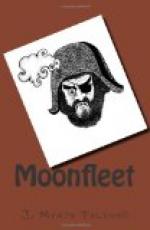On the breast of this silent and swathed figure lay a locket, attached to the neck by a thin chain, which passed inside the linen bandages. A whiter portion of the flannel showed how far the beard had extended, but locket and chain were quite black, though I judged that they were made of silver. The shape of this locket was not unlike a crown-piece, only three times as thick, and as soon as I set eyes upon it I never doubted but that inside would be found the diamond.
It was then that a great pity came over me for this thin shadow of man; thinking rather what a fine, tall gentleman Colonel Mohune had once been, and a good soldier no doubt besides, than that he had wasted a noble estate and played traitor to the king. And then I reflected that it was all for the bit of flashing stone, which lay as I hoped within the locket, that he had sold his honour; and wished that the jewel might bring me better fortune than had fallen to him, or at any rate, that it might not lead me into such miry paths. Yet such thoughts did not delay my purpose, and I possessed myself of the locket easily enough, finding a hasp in the chain, and so drawing it out from the linen folds. I had expected as I moved the locket to hear the jewel rattle in the inside, but there was no sound, and then I thought that the diamond might cleave to the side with damp, or perhaps be wrapped in wool. Scarcely was the locket well in my hand before I had it undone, finding a thumb-nick whereby, after a little persuasion, the back, though rusted, could be opened on a hinge. My breath came very fast, and I shook so that I had a difficulty to keep my thumbnail in the nick, yet hardly was it opened before exalted expectation gave place to deepest disappointment.
For there lay all the secret of the locket disclosed, and there was no diamond, no, nor any other jewel, and nothing at all except a little piece of folded paper. Then I felt like a man who has played away all his property and stakes his last crown—heavy-hearted, yet hoping against hope that luck may turn, and that with this piece be may win back all his money. So it was with me; for I hoped that this paper might have written on it directions for the finding of the jewel, and that I might yet rise from the table a winner. It was but a frail hope, and quickly dashed; for when I had smoothed the creases and spread out the piece of paper in the candle-light, there was nothing to be seen except a few verses from the Psalms of David. The paper was yellow, and showed a lattice of folds where it had been pressed into the locket; but the handwriting, though small, was clear and neat, and there was no mistaking a word of what was there set down. ’Twas so short, I could read it at once:
The days of our age are threescore years and ten;
And though men be so strong that they come
To fourscore years, yet is their strength then
But labour and sorrow, so soon passeth it
Away, and we are gone.
—Psalm 90, 21




